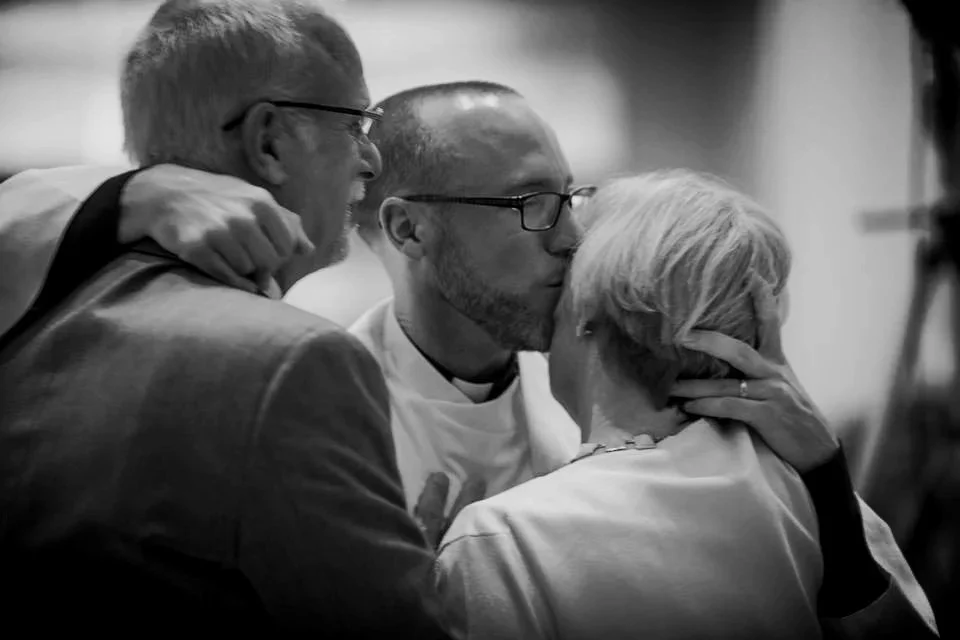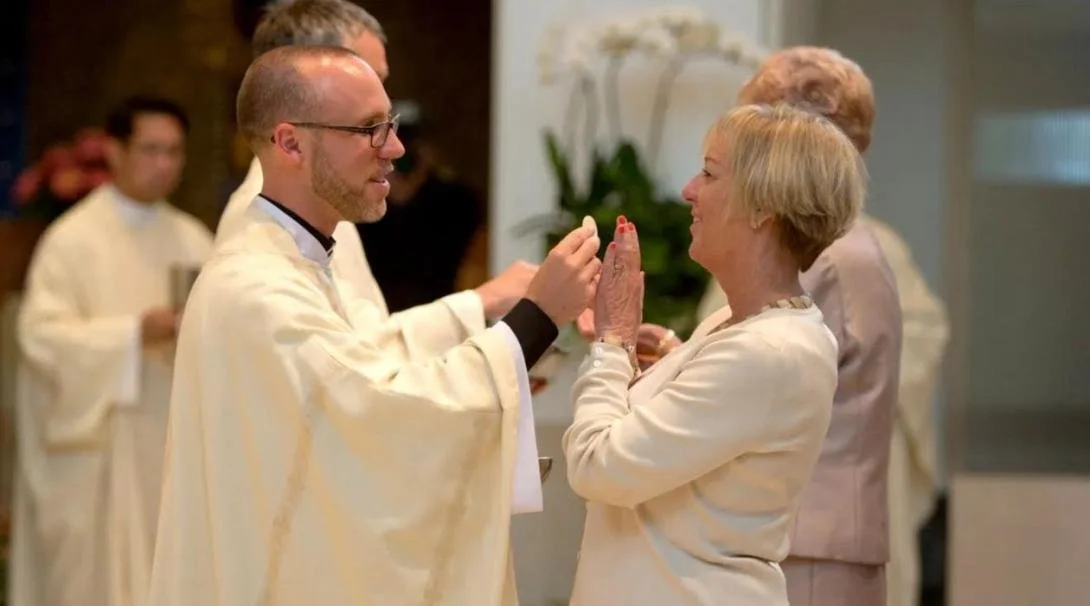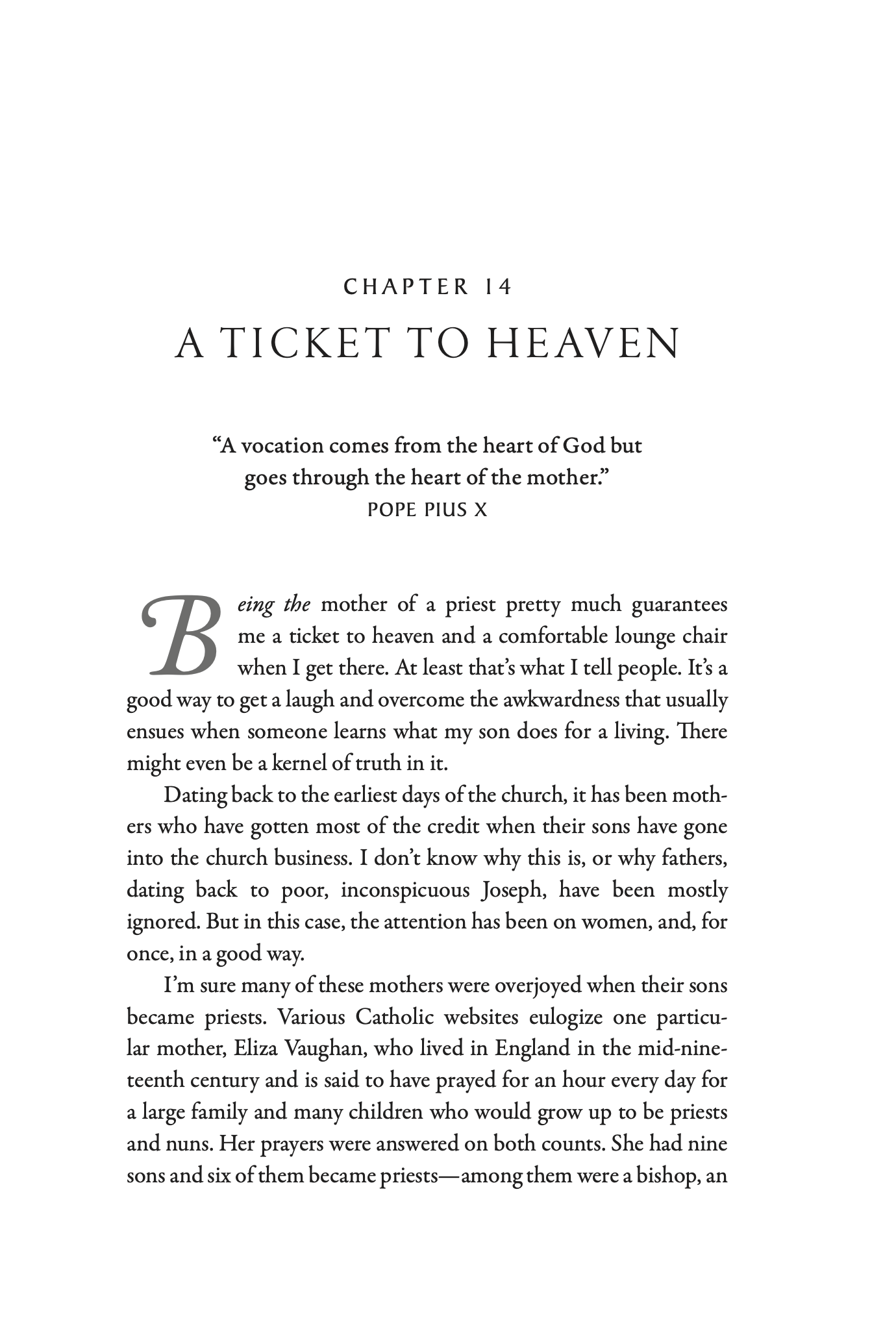







About the Book
My Son, the Priest: A Mother’s Crisis of Faith
You send your son off to college and you think that in a few years you might get a call, and he’ll announce that he has someone he’s bringing home, someone he wants you to meet. But then that someone turns out to be a recruiter hawking a lifetime of poverty, chastity and obedience. What college kid in his right mind would sign up for that?
About the Book
My Son, the Priest: A Mother’s Crisis of Faith
You send your son off to college and you think that in a few years you might get a call, and he’ll announce that he has someone he’s bringing home, someone he wants you to meet. But then that someone turns out to be a recruiter hawking a lifetime of poverty, chastity and obedience. What college kid in his right mind would sign up for that?
Signed copies available for purchase from the author: contact kristin.gilger@asu.edu
Published by Monkfish Book Publishing Co., Rhinebeck, N.Y.
“My Son the Priest” offers a rare, often entertaining glimpse into the highly unusual Jesuit formation process, which includes sending would-be priests off on pilgrimages with $35 in their pockets, what happens when a priest falls in love, and what it’s like to share living quarters with a bunch of guys who don’t always make perfect housemates.
If you’ve ever wondered how Pope Francis got to be pope (after all, he was a Jesuit who made a public promise not to “strive for” or “ambition” high offices in the church), why Jesuits may be harder to spot than other priests, or what the virgin martyrs may still have to say to us, the answers are here in this captivating memoir.
The book also takes on tough issues, from the church’s history of sexual abuse to its treatment of women, and asks some challenging questions: Is it possible to be Catholic, liberal, and a feminist all at the same time? What does it mean to call yourself a Catholic?

Endorsements
Endorsements
“Kristin Grady Gilger wowed me with an astonishing memoir about her son’s joining the Jesuits despite her having high-tailed it out of the Church for the typical reasons—birth control and abortion, the hierarchy and scandals. But over time, his profound faith opened her heart and mind in ways you’ll never see coming. I champion this read for reader and cynic alike: it’s a page turner. Bravo!” —Mary Karr, author of the New York Times best-selling memoirs The Liars’ Club, Cherry, and Lit
“Kristin Gilger has written a startlingly intimate and honest book. She doesn’t just grapple with her son’s decision to become a priest, but with the complex way the institution has impacted her Catholic family over generations, served as a vehicle for social politics she abhors, failed in the most hideous ways in its responsibilities, and yet nonetheless offered the structure and rituals that still help those of us who pray, ‘Lord I believe, help my unbelief’ to find a pathway to God.” —Phil Klay, author of Redeployment, winner of the National Book Award
“A generous, insightful, and charismatic young man tells his family he wants to become a Jesuit. What does his loving, fiercely intelligent, lapsed-Catholic mother want? As journalist Kristin Grady Gilger tells us in this gorgeously written account of her son Patrick’s journey to the priesthood, ‘I wanted it to stop.’ Gilger’s book is spiritual biography, as much hers as her remarkable son’s. If the admirable Paddy Gilger, SJ’s example does not incline you more deeply toward the mysteries, demands, and surprises of faith, his mother Kristin’s just might.” —Tracy Fessenden, Steve and Margaret Forster Professor of Religious Studies, Arizona State University
“In this thoughtful and empathetic memoir, Kristin Gilger invites readers to experience the highly unusual journey of a lapsed Catholic mother whose son decides to become a priest. With a journalist’s eye for observation and detail, she invites us into the story of how her son’s radical life choices have impacted their family. This book asks tough questions about faith and the Catholic Church, but never loses sight of the humanity at the center of all things.” —Kaya Oakes, author of The Defiant Middle: How Women Claim Life’s In-Betweens to Remake the World
“There are many ways to approach a book like My Son, the Priest. It’s about Paddy [Gilger’s son], of course, and the Jesuits. It’s about the legions of people who have become disillusioned with the Catholic Church and the many who have stayed despite the Church’s obvious problems. It’s about parents and the lengths they will go to in to keep their children close. But more important, it’s a beautifully written tale of spiritual growth, the kind of growth that happens when you’re brave enough or scared enough or inspired enough to open yourself up to the possibility of the life of faith.” —James Martin, SJ, author of The New York Times bestsellers Jesus: A Pilgrimage and Learning to Pray
“A masterfully told tale about a mother and her son, a readable, relatable book that asks and answers challenging questions about family and spiritual growth. This is not only a story for Christian readers, although they will find special meaning in the compelling exploration of the Jesuit lifestyle and of the rich and often troubled history of Catholicism. It is not just a book for mothers and sons, although the author explores the nature of that relationship with the keen and revealing eye and clear voice of a journalist. It is a book for all who wrestle with questions of faith, who wonder about our paths as we watch our children choose their own.” —Mark Hass, author of The Days Before Tomorrow; Arizona State University professor
“There is no greater gift than the love of a parent and Kristin Gilger beautifully captures her journey and that of her beloved son, Paddy, when he makes the decision to become a Jesuit priest. You will be touched.” —Manuel Garcia, editor-in-chief of Houston Landing, and former executive editor, Austin American-Statesman

Media
Media
Kirkus Review: kirkusreviews.com
An exploration of faith, doubt, and family that expertly balances tender recollection with sharp insight. … Gilger’s prose is consistently engaging—it’s succinct, humorous, and laced with self-awareness. She easily distills complicated theological practices and historical contexts into plain language filled with wry one-liners. (When discussing her attempts to commune with God, she jokes, “Being out of practice, it was a short conversation.”) Her skill as a journalist shines through in her deft scene-setting and dialogue; the author recreates difficult conversations with her son without ever losing her sharp, objective perspective.
Publisher’s Weekly Review: publishersweekly.com
Gilger critiques Catholicism while leaving room for its mysteries (‘I’ve given up trying to know everything, and I’m beginning to accept what I can’t possibly know yet deeply feel’). Most affecting is the depiction of a mother’s unflinching willingness to follow her son into unexpected places ('We went with Patrick, haltingly and stumbling at times, but we went with him’). This will strike a chord with Catholics who have questioned their own faith.
Article: Focolare Media
“Not the Life I would Have Chosen for My Son”
Article: America Magazine
“How Writing a Book Changed My Understanding of the Divine,” November 2025 issue
The Los Angeles Times Review of Books: Ambivalence and Devotion
… a frank and affecting memoir that braids together family history, investigative reporting, and theological questioning. At its heart lies a universal parental dilemma: how to love a child whose choices don’t align with the vision his mother had for him. … In the end, My Son, the Priest is less a memoir of conversion than one of mutual acceptance: between mother and son, doubt and faith, ambivalence and devotion. Gilger never resolves her unease with Catholic teaching, nor does she pretend to. But she does learn to appreciate the beauty her son finds in the church: its history, its liturgy, its ability to offer both courage and wonder. In a time when American Catholicism is as polarized as the culture around it, Gilger offers no easy answers. What she offers instead is rarer: an honest account of trying to remain open, of saying yes where she can, and of loving through deep differences.

Events
Events
November 12, 2025: Book Launch (Chicago, IL)
Wednesday, Nov. 12, 2025, 6:30-8 p.m.
Loyola University Chicago: Hank Center for the Catholic Intellectual Heritage, Information Commons, 4th floor, Lake Shore Campus
Free Event. Click here for more information.
November 16, 2025: Book Discussion (Omaha, Neb.)
Sunday, Nov. 16, following the 8 a.m. and 10:30 a.m. Masses
St. John’s Church, Creighton University, 2500 California Plaza, Omaha, Neb.
Free Event. We’ll meet in Lower St. John’s after the Masses.
November 25, 2025: Book Discussion (PHOENIX, AZ)
Tuesday, Nov. 25, 6:30 p.m.
Changing Hands Bookstore, Midtown Phoenix.
Free Event. Click here for info & RSVP

Excerpt
Excerpt

Bio
Bio
Kristin Gilger is Emerita Professor at the Walter Cronkite School of Journalism and Mass Communication at Arizona State University, where she served as interim dean, senior associate dean, associate dean, and assistant dean over a 16-year period.
At Cronkite, she also served as director of the Donald W. Reynolds National Center for Business Journalism and led the National Center on Disability and Journalism.
Prior to joining the Cronkite School, she had a 20-year career in newspapers. She was deputy managing editor for news at The Arizona Republic in Phoenix, Arizona; managing editor of the Statesman-Journal newspaper in Salem, Oregon; and suburban editor at the Times-Picayune newspaper in New Orleans. She began her career as the farm reporter at the St. Cloud Daily Times in St. Cloud, Minn.
She is the co-author of the book, “There’s No Crying in Newsrooms: What Women Have Learned About What it Takes to Lead,” published by Rowman & Littlefield. Articles she has written have appeared in the Columbia Journalism Review, America Magazine, and The Arizona Republic, among others.
She was awarded the Order of the Silver Key for outstanding service to journalism by the Society of Professional Journalists and the Most Distinguished Alumnae Award from the journalism faculty of the University of Nebraska-Omaha. She holds bachelor’s and master’s degrees in journalism from the University of Nebraska.
Patrick Gilger, S.J., a sociologist of religion, studies the way religious practices shape people and how those people shape democratic politics. He is a Jesuit priest and a faculty member in the Department of Sociology at Loyola University Chicago, where he also directs the McNamara Center for the Social Study of Religion.
In 2021 Gilger was awarded the Alfred Schutz Prize in Philosophy and Sociology for his dissertation, which was granted by the Graduate Faculty of the New School for Social Research. His scholarly work has appeared in journals such as the Journal of Religion and Society and the European Journal of Cultural and Political Sociology, and he has chapters forthcoming in a number of collected volumes, including A Quarter Century of Public Religions: The Sociology of Jose Casanova.
A frequent media commentator and contributor in the popular press, Gilger has appeared on NPR, CNN, and Fox, and his writing has appeared in Vox, The Dispatch, and America Magazine, where he serves as Contributing Editor for Culture. In 2021, his essay “Litany for a Pandemic” received a New York Press Club Award.
He holds graduate degrees in philosophy and theology and served as a Research Fellow at Georgetown University’s Berkley Center for Religion, Peace, and World Affairs.

Connect
Connect
Connect
Connect





